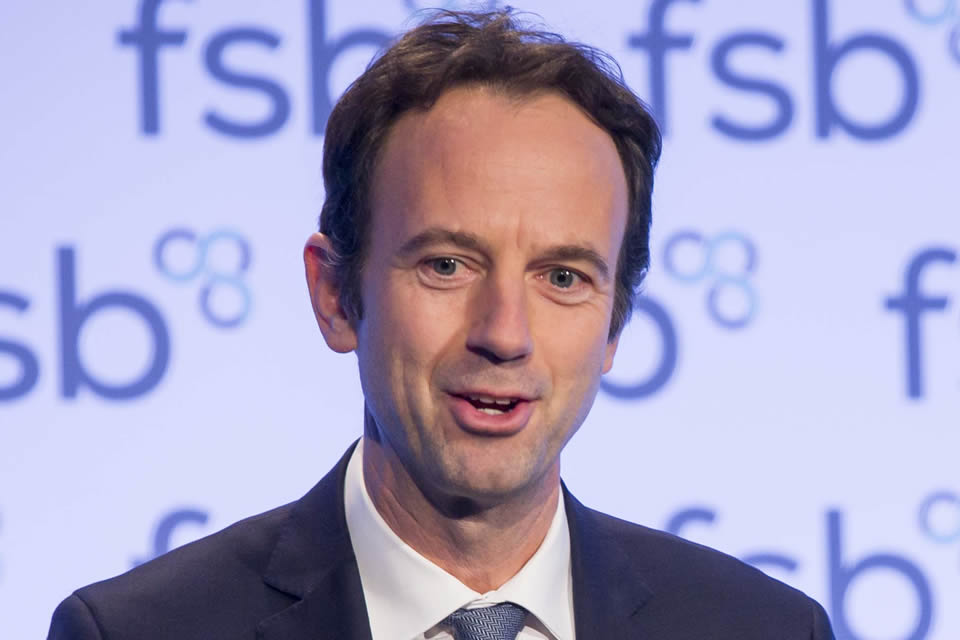Alex Chisholm: how competition helps to grow tomorrow’s entrepreneurs
Speech given by CMA Chief Executive, Alex Chisholm, at the FSB Policy Conference 2016.

Growing tomorrow’s entrepreneurs – competition and innovation
Firstly, I’d like to thank the FSB (Federation of Small Businesses) for inviting the CMA to take part in this conference.
Before the siren call of government service, I spent some happy and productive years as an entrepreneur with my own small business, so it’s great to be back with this community this afternoon.
And it’s important to recognise the invaluable role you play in growing the UK economy, and to ask how we can best support you.
Now some here may be asking how competition and innovation relate to one another, and why do they matter?
According to economists, competition comes in 2 forms: static and dynamic.
Static is the common form everyone will recognise – skirmishes between rivals based on price and product, bringing incremental benefits to consumers.
Dynamic competition, on the other hand, is the kind of development that can turn an entire market on its head.
Such disruptive innovation blows a ‘Schumpeterian gale’ through markets – striking ‘not at the margins of the profits and the outputs of the existing firms, but at their foundation and their very lives’.
For those unfamiliar with a Schumpeterian gale, fear not – I had to look it up the first time I heard it as well.
Whatever the form, competition and innovation can lead to big gains in productivity and very tangible benefits to consumers and the UK economy.
The UK is one of the best business environments in which to operate, and one of the easiest places to set up a business.
According to Companies House there were just under 600,000 new incorporations last year (against 360,000 dissolutions.)
One of the reasons we see this high level of company formation is because entrepreneurs feel they have a reasonable chance of success – the dice are not loaded against them. Competition enforcement plays a part in this.
Innovation can come from anywhere; it can be start-ups, or existing enterprises developing business models to harness new technology and meet new demand.
It occurs even in mature industries with established incumbents, finding new ways to improve efficiency and sustain margins.
Wherever innovation occurs, major changes in markets can occur. Think of the book industry before a young Amazon arrived, and how the product as well as the distribution have been transformed since
Similarly, the music industry was upturned with the introduction of iTunes, and now Spotify’s streaming service.
The retail banking market is beginning to change, with the impact of the ‘Fintech’ players. Indeed we are about to see the first online-only banking provider.
Energy will be transformed by smart meters.
‘Smarts’ of a different kind are bringing big changes to the private hire transport market.
The challenge in all this is to ensure an economic and regulatory environment in which new business models and consumer-friendly innovations can emerge and thrive.
Innovation is fragile; it can be suppressed in many ways, putting the brakes on the development of an industry, and the businesses operating within it.
It can be the behaviour of cartels, colluding to keep business for themselves, or larger companies abusing their size and dominant position to force out smaller challengers.
We stand ready to punish such behaviour and have a dozen live cases today.
You can help us by bringing well-justified complaints to our attention.
It isn’t always underhand dealing which frustrates innovation.
Sometimes regulators trying to protect the market can get in the way themselves by being too slow to update frameworks to reflect market realities.
You may be familiar with the recent debate surrounding proposed new regulation in the London taxi market, and the challenge by companies like Uber and its ilk to the famous black cabs.
Our view is that the regulatory framework should seek to accommodate consumer-friendly innovation, not introduce new rules which unduly restrict new service models.
Consumers want: lower prices, shorter waiting times, and increased responsiveness – let them have it!
Creating new regulation for every landscape change slows down future developments, and creates unnecessary obstacles.
Disengaged consumers also pose considerable problems to growing innovative businesses.
You can wave frantically to attract attention to your exciting new offering, but it makes little difference if consumers aren’t looking.
If consumers don’t understand the market, or know what options are available, they can become disengaged.
Part of our work in energy and banking is raising awareness of the potential benefits for consumers of switching providers or accounts to get better rates or better service. This will help smaller ‘challenger’ companies to expand.
Consumers are also influenced by reputation, so we’ve been looking into the online reviews sites that 56% of adult consumers use before making purchases, and challenging unfair practices such as fake reviews and suppression of negative feedback.
Competition authorities like us like to see new businesses bringing innovation and challenging established players.
Thriving competition and disruptive innovation can indicate that a market is functioning properly, benefiting not just the consumers, but the businesses involved, and the economy.
We know that most businesses want to comply with the law and we want to help them to do so.
Together with the FSB, we have developed tailored materials to help businesses like yours to recognise anti-competitive practices, and how to report them.
When businesses manipulate markets, it is often the smaller businesses, and ultimately the consumers, who suffer.
So, in summary, I am here today to introduce the CMA to FSB members, and encourage you all:
- to make use of our materials to help comply with the law;
- to bring complaints to us if you are victims of anti-competitive behaviour; and
- to support our mission of promoting innovation in the economy.